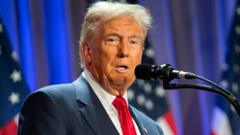In a significant legal development, a US appeals court has officially dismissed the last federal criminal case against Donald Trump, which focused on allegations related to the illegal retention of classified documents. This decision, made on Tuesday at the request of Special Prosecutor Jack Smith, comes on the heels of another dismissal regarding accusations that Trump attempted to overturn the 2020 election results. Smith, appointed by Attorney General Merrick Garland, indicated that the dismissals were not attributable to the merit of the cases but rather the legal principle that a sitting president cannot be prosecuted.
Both cases were dismissed "without prejudice," meaning they may be reinstated once Trump completes his term in office. Smith asserted in his court request that the outcome was not reflective of the underlying strength of the allegations against Trump. The former president had consistently pleaded not guilty in both cases. Notably, after his tenure, Trump engaged in unprecedented legal challenges for a former president, including a conviction tied to a payment made to adult-film actress Stormy Daniels.
Earlier this year, Trump faced nearly 100 criminal charges across various federal cases and others. The Supreme Court's ruling this summer indicated that a former president was protected from prosecution for activities classified as "official acts" performed while in office, contributing to Trump's subsequent election victory. With most of the serious criminal charges now dropped, the focus shifts to a pending case originating from Georgia, although its progress remains stalled.
Trump publicly denounced the federal investigations as politically motivated, labeling them "empty and lawless," and declaring them a "political hijacking" of the system. Vice-President-elect JD Vance echoed this sentiment, suggesting that had Trump lost, he might have faced severe legal consequences. Trump has indicated plans to terminate Smith upon taking office in January, who has been reported to consider resigning soon after.
The conclusion of these cases also emphasizes the complex relationship between legal proceedings and political ramifications. The special prosecutor still aims to pursue charges against two of Trump's associates, Walt Nauta and Carlos De Oliveira, who have also pleaded not guilty. However, Smith's decision to continue with these cases has drawn criticism, with legal representatives pointing to poor judgment in the ongoing legal narrative against Trump's employees.
Meanwhile, uncertainties remain regarding the status of Trump's state-level criminal cases, particularly in New York and Georgia, where proceedings may be affected by Trump's recent electoral success. Certain legal analysts argue that as the newly elected president, Trump’s criminal entanglements may evaporate under the legal protections granted to sitting presidents. The political landscape leading up to the 2024 presidential election, including Trump's approach to his legal troubles, will be pivotal in shaping public perception and potential outcomes in the courtroom.




















